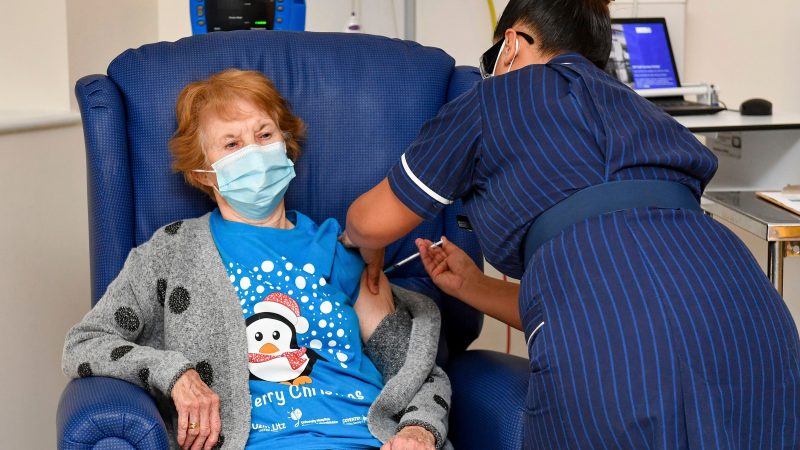
As I write, I am about to join our amazing primary care team for another day of vaccinating over 80s. We have three days to vaccinate over 1,000 patients before the Pfizer vaccine reaches the end of its shelf life. The vaccination is run from a ‘pop-up’ clinic at a community centre at the heart of one of the more deprived areas of Oxford. I’m proud that the community is able to get behind this and support the effort, which is entirely delivered by NHS workers and volunteers.
Our first weekend of vaccinating was a genuine privilege. Seeing how a team of nurses, healthcare assistants, volunteers, GPs, admin staff and more came together and dealt with various challenges was wonderful – a thousand times better than any team building exercise I’ve experienced. Seeing the reaction of elderly patients being offered the vaccine was quite emotional. Most of them were coming out of their homes for the first time in months.
For some, we clearly were the first people they had seen for weeks; for most, they visibly showed the ravages of lockdown – muscle loss, cognitive decline, and they sadly weren’t walking as confidently as before. However, when they saw familiar staff from our GP surgery, they felt reassured, and by the time they had been through the process they were visibly bouncier and a lot more cheerful. Feedback afterwards was incredible, both in the car park and by phone (and email!) the week after.
The Labour, TUC and Daily Mirror campaign ‘Let’s Vaccinate Britain’ is very welcome. We must get as many people vaccinated as quickly as possible, and do so safely and fairly. We can all play our part in reassuring our friends, family and colleagues about the vaccine. We can all help in one way or another, either by volunteering or giving ‘air cover’ to our vaccinating teams.
Vaccinating the target groups before mid-February is very possible. It can be done, and it must be done – anyone who dies who could have had a vaccine is an individual tragedy. It is also our only real way back out of restrictions, and to get people’s jobs and health back safely.
We will need the government to be active, efficient and dedicated. We know that these are not their usual characteristics, so we will have to hold them to account, but also do as much as we all can to make up for any shortcomings. There are a number of key tasks.
Firstly, the vaccine needs to get to the vaccinators as soon as possible. If we have it, we can give it. There needs to be clarity, consistency and predictability of the vaccine supply. At the moment, there is lack of transparency, lack of vaccine and lack of clear timescale, as well as a postcode lottery developing. This makes it very hard to plan staffing, and we have a situation with frustrated vaccinating teams waiting for the vaccine. The ‘rate-limiting step’ is supply, not staffing, at the moment.
Secondly, we need to expand our workforce and reprioritise our work. Once we know the plan for vaccine supply, we can plan to staff the clinics and increase the workforce. This is where volunteers, retired nurses and newly recruited vaccinators come in. This needs to be through the NHS: if new private companies step in, we will see delay, complications and cost. Putting the needle in is the easy bit – the organising, recall, bureaucracy and clinical governance takes a lot of time, and we need people who know how to do this. We should learn lessons from test and trace and many failed outsourcing projects.
Thirdly, we need to make sure that those who most need vaccinating are vaccinated and inequity in society doesn’t worsen. This task starts now and will be an ongoing effort. There is a risk that those from excluded communities, whether due to geography, class, income, ethnicity or vulnerability, do not come forward or have poor access to the vaccine.
Rumours and scaremongering must be countered. Local community groups and councils who know their populations should be involved in this early stage to support and monitor uptake. Local champions of vaccinating can help, and peer-to-peer messages are very important. A major concern is the very groups who are most likely to benefit from the vaccine are likely to be those least likely to get it (with the exception of the elderly).
Areas in which primary care is struggling need support and help from other areas to ensure that we function as a truly national service and people don’t lose out from their existing disadvantages. The NHS and the Labour Party are founded on the principles that will help us get through this well: universality, equality, solidarity and social justice.




More from LabourList
Government abandons plans to delay 30 local elections in England
‘The cost of living crisis is still Britain’s defining political challenge’
‘Nurses are finally getting the recognition they deserve’